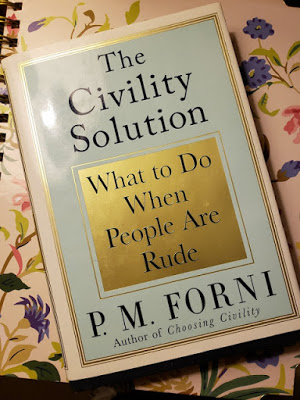I bet this title alone intrigued you. It intrigued me too as it is the chapter that I am now reading in The Civility Solution. I mentioned this book back in December and I am still reading it.
Now that the holidays have passed and work has gone back to normal I can get back on schedule with reading. One of the first sentences in this chapter was, “Rudeness is the ugly face that disagreement shows when it’s mismanaged.”
I read this sentence twice…
Photo by Micheile Henderson on Unsplash
I read it twice because it is true. Haven’t we all done this? I know I have. When I don’t understand the person that I am communicating with sometimes I can be rude. Honestly, it doesn’t happen often with people outside my circle as with people inside my circle.
But I am on a journey to improve my thoughts and emotions when discussing issues with individuals. Dr. Forni says, “when you disagree, focus on the other person’s position to gain a full understanding of it and make sure that your disagreements are warranted.”
He also asked questions like, ” how many times have you argued for the mere sake of arguing? How many times have you turned the discussion into an opportunity to make the other person look bad?”
He then goes on to say, “Success is progress measured against the betterment of a situation, not the defeat of a person.” I needed to read that because sometimes that is the goal of an argument. To defeat the other person instead of making the situation better.
He encourages you to start asking yourself radical questions. “Why do you have an urge to prove yourself all the time?” We need to take a good look at our accomplishments. Silence your inner critic and avoid comparing yourself to others.
“The next time you are engaged in a confrontation, be aware of the dynamics at work. Stop and think. “Is my insecurity pushing me to prevail at all costs?” Which is more important, that I prevail or that the issue is resolved in the best practical manner?” Am I even listening to the other person? Is he or she offering good solutions?”
If the other person is unwilling to follow you on this path then you can respond with: “Let’s give this some more thought before we talk again.” Your hope is that this pause will inject a dose of rationality into the situation.
photo credit Annie Spratt
And lastly, if you are in a marital disagreement Dr. Forni suggests not to communicate that dismissive, “I don’t understand to “Help me to understand.” That does sound better and it suggests that you are open to their ideas and help.
Well, I hope that you enjoyed this small chapter from Dr. Forni’s book and may have found some information on helping you on your path to disagreeing graciously. Happy Monday!









 And her last chic assignment was to read a book. I have been reading the
And her last chic assignment was to read a book. I have been reading the 


















